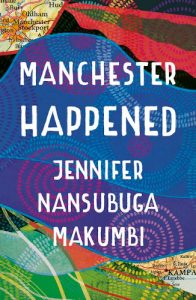Jennifer Nansubuga Makumbi’s new book Manchester Happened reflects the here-and-there double consciousness of living between Uganda and England, writes Wamuwi Mbao.

Manchester Happened
Jennifer Nansubuga Makumbi
Bloomsbury, 2019
The holler and cry that has accompanied England’s sclerotic decision to retreat into the nostalgia Neverland of Brexit has exposed a vein of nativism that had happily been obscured in the received idea mainstream white Britain has of itself. But Inglan has never had things entirely its own way. Before Stormzy said ‘Fuck Boris’, and even before the Empire Windrush brought West Indians over to England in a duplicitous post-World War II proto-regeneration scheme, Black voices have been decrying the racist superiority complex England clutches to itself when things get rough.
Think of ER Braithwaite’s To Sir, With Love. (No, not the mawkish Sidney Poitier vehicle.) The novel succeeds not simply because it depicts the racism of an England still enrubbled by World War II, but because it shows that racism to be the product of a stubborn insularity that was no longer going to be possible in the new cracked-open world. The story of England, past, present and future, is stitched through with the narrative threads of other nations.
The title of Jennifer Nansubuga Makumbi’s collection of stories, Manchester Happened, seems a complete story in and of itself. It invites lingering questions: What happened in Manchester? Or, to whom did Manchester happen? Over the course of three-hundred-odd pages of layered storytelling, we find out. The industrial city is also historically a hub of transit, and it is around this hub that the stories swirl. (The Northern setting, incidentally, is a happy shift away from metropolitan London, which is less interesting as a setting than many authors seem to believe.)
The delights with Makumbi’s work are immediate. Rather than sprawling whole-family narratives, what happens is visited upon individual subjective characters, whose stories are told in what the author calls ‘unfiltered snapshots’. These stories are ‘about’ what happens when you find yourself having to make a new place for yourself in a world that promises much, but extracts as much as it gives. These are stories of complicated experience, awkward adjustment or disenchantment. They reflect the experience of a cluster of Ugandans who inhabit England, pass through England, long to leave England, or are thinking about their time in England as they return or resettle in Uganda.
Some of the stories are grey and touching, like ‘Our Allies The Colonies’. In this delicately constructed piece, set in the nineteen-fifties, Abbey works in a factory and contemplates returning home. His journey to Manchester has seen him shed names and identities like a snake: Ssuuna Jjunju becomes Abu Bakri to ease his passage through Mombasa. Stopping in Manchester when the ship he has boarded experiences engine trouble, he remains behind and becomes Abbey Baker. These shifts correspond with a trajectory towards self-actualisation that is abruptly interrupted when he learns that the white woman he has been seeing is pregnant with his son.
Abbey’s story is one of the narratives set in earlier decades, and its heart-rending poignancy is compelling. Most of the other stories are more contemporary, but all exhibit the same concern with how trajectories of success are undermined by deeply human dilemmas. Makumbi’s characters are thwarted by circumstance, stymied by broken parents or unfaithful spouses, blocked by remembered grievances. Her prose moves us fluidly along, so that you find yourself a couple of stories deep in very short order. If her debut novel Kintu (2014) marked her as a natural storyteller, these shorter narratives allow us to inhabit her sensibility at different proximities.
I should point out that Makumbi’s characters are not refugees or illegal immigrants, and in many instances they aren’t poor either (stereotype is not entertained here). Instead, they are characters who find themselves in Britain because of their own, or their parents’, belief that being there will confer some kind of better life upon them. Makumbi writes in that energetic free-range prose that has become bien pensant for everyone writing about England after Zadie Smith. Some of her characters have to negotiate what their Africanness means to other people, with unexpected and occasionally darkly funny results. ‘My grandmother says that sweat is the best moisturiser,’ the narrator in ‘The Nod’ says, only to see the deception register at once on the face of her mysterious interlocutor. Solidarities are hard to come by, and colour is no guarantee of kinship.
In this regard, Makumbi is a great noticer of humiliations and indignities. Here is the protagonist of the story that gives the collection its name:
The first thing I was told when I arrived was You don’t go gushing at someone just because you’ve heard them speak Luganda. Ugandans would look at you in a Mpozi, which car boot brought you here way.
The compelling pressure of these stories is the force of the history that precedes the moments we witness, a history not spoken of, but indelibly present nonetheless. The fraught complexities of engaging with other Ugandans abroad filters through often:
There was distrust and intrigue within the community. You had to be careful who you sought to network with on jobs, housing and visa issues. You had to be careful how much of yourself you put out there. A lot of people hid from fellow Ugandans. A lot of people in public were hidden. Rumours were like rumours.
Not all the stories work as well as they ought to. The ones that don’t usually falter because they abscond before the story has quite resolved itself. Others are promising in premise, but don’t really deliver, such as the story narrated by a dog who finds herself unwittingly transported to Britain by a kind-hearted man who deals in animal contraband. Sounds intriguing? It could have been, but the execution is oddly aimless. It feels like an experiment in narrative consciousness, but one which fails to fully inhabit its conceit, and so does not come to life.
Makumbi’s fictions, when they are about people, manage to be reflective without devolving into parables. In the better stories, she gives her characters ample room to explore what migration means. If these characters are often ambivalent about the promises of England, they are nonetheless aware that they can’t go home again:
Nothing scared us like going back home looking like a failure. Besides being laughed at—did you see her? London scotched her! Besides, the brave ones who tried to talk about it were accused of scaremongering: If Britain is as harsh as you say, why don’t you come back home?
What do you say to that? That starting all over again in Uganda is scary? That you’re saving to return but it may never happen? After all, there are those that made it, legitimately or otherwise. So we killed ourselves working, ensnared ourselves in debt so we could masquerade when we came home and perform success and perpetuate the dream. But inside? Inside we were dying.
This is marvellous writing. Makumbi’s extraordinarily subtle eye for detail works well with the short story format. She carries over the anxieties of her myriad characters while remaining far enough apart to present the story clearly.
A short story collection is often an odd second act to a successful novel. The publisher clamours for something else to sustain the bubble of interest, and because many authors have at least a few short pieces squirreled away it can be seen as a logical next step. The one difficulty shared by most story collections not conceived from the start as such is that the book is stitching together tapestries that were never meant to hang side by side. The results are often uneven in quality, the rich fabric of the better stories sutured unfavourably to the more modest ones. The strongest story in Manchester Happened is not the eponymous tale of two estranged sisters, but the waspish ‘Let’s Tell This Story Properly’, a tightly wound narrative in which detail is pared efficiently and seamlessly until meaning emerges. We follow Nnam around her Manchester home, watching her clean, as a storm of revelation gathers in intensity before opening up in a devastating manner. It’s a brilliantly unsentimental piece of fiction, an immersion into the toxic effects of the here-and-there double consciousness of living between Uganda and England.
Manchester Happened has the measure of modern England. The collection manages to produce from its thematic an intricate structure that makes for satisfying reading. It feels like a powerful contribution towards the creation of a vitally needed counter-narrative of England. It will undoubtedly take its place as a primer for Makumbi as her published list grows, and that is where it is at its strongest, for it simultaneously exhibits admirably broad range and impressively specific focus.
- Wamuwi Mbao is an essayist, cultural critic and academic at Stellenbosch University. Follow him on Twitter.






One thought on “A powerful contribution towards the creation of a vitally needed counter-narrative of England—Wamuwi Mbao reviews Manchester Happened by Jennifer Nansubuga Makumbi”